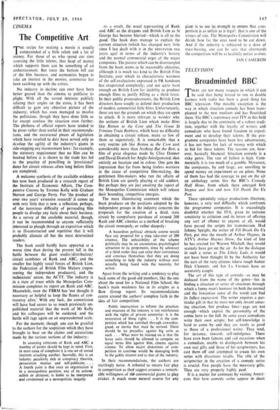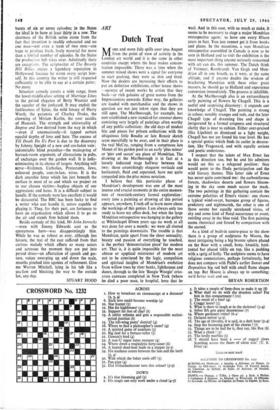Broadminded BBC
TELEVISION THERE are not many respects in which it can be said that being forced to run in double harness with radio has been a good thing for BBC television. One notable exception is the way in which situation comedy has been trans- planted to the new medium and has flourished there. The BBC's supremacy over ITV in this field is largely due to the continuity of a robust tradi- tion, together with the loyalty of writers and comedians who have found freedom to experi- ment and to develop their talents. If the pro- gramme companies have been less adventurous, it has not been for lack of money with which to bid for these talents. The reasons are, how- ever, basically financial. Situation comedy is a risky genre. The rate of failure is high. Com- mercially it is ,too much of a gamble. Moreover, the companies, by and large, are unwilling to spend money on experiment or on pilots. None of them has had the courage to put on the air an anthology series like the BBC's Comedy Half Hour, from which there emerged first Steptoe and Son and now Till Death Do Us Part.
These splendidly vulgar productions illustrate, however, a very real difficulty which confronts the programme companies. It is exceedingly doubtful whether the ITA, given its extreme sensitivity to criticism and its terror of offering any sort of offence to anyone at all, would have passed the scripts for transmission. Had Johnny Speight, the writer of Till Death Do Us Part, put into the mouth of Arthur Haynes, in ATV's Arthur Haynes Show, the kind of line he has created for Warren Mitchell, they would scarcely have got on the air. As for the dialogue in such a series as The Likely Lads, it would not have been thought fit by the Authority for the ears of the very citizens whose rough banter Dick Clements and Ian La Fresnais have so accurately caught.
The art of this type of comedy—as may be deduced from the name of the genre—lies in -finding a situation or series of situations through which a funny man's humour (in both the normal and the Jonsonian sense of the word) can find its fullest expression. The writer requires a par- ticular gift in that he must not only invent amus- ing situation, but produce lines—gags are not enough—which exploit the personality of the comic hero to the full. In some cases comedians write their own scripts; but self-knowledge is hard to come by and they are rarely as good as those of a professional writer. They tend, for instance, towards self-indulgence. There have even been famous and sad occasions when a comedian, unable to distinguish between his own real gifts and those of his scriptwriters, has cast them off and attempted to create his own series with disastrous results. The role of the scriptwriter in the creation of a comedy series is crucial. Few people have the necessary gifts. They are very properly highly paid.
It is a matter for comment by visiting Ameri- cans thit here comedy series appear in short
bursts of six or seven episodes; in the States the ideal is to have at least thirty in a row. The shortness of the British series stems from the fact that invention is readily exhausted and no one man-nor even a team of two men-can hope to produce fresh, lively material for more than a limited number of episodes. In the States the production belt takes over. Admittedly there are exceptions. The scriptwriter of The Beverly Hill Billies enjoys a legendary reputation in Hollywood because he wrote every script him- self. In this country the writer is still respected sufficiently to be able to say at a certain point : No more.
Situation comedy covers a wide range, from the lower-middle-class setting of Marriage Lines to the period elegance of Berty Wooster and the squalor of the junkyard. It may exploit the fecklessness of Sykes, the mild lunacy of Harry Worth, the paranoia of Charley Drake, the clowning of Miriam Karlin, the sour accidia of Hancock. The strength and universality of Stepfoe and Son derived from the way in which -even if unconsciously-it tapped certain squalid depths of love and hate. The success of Till Death Do Us Part is due to the discovery by Johnny Speight of a new and ore-laden vein: indomitable blind prejudice-the mainspring of barrack-room argument, of altercations in pubs, of exchanges over the garden wall. It is indis- criminating in its choice of targets. Anything will serve-Irishmen, Catholics, Protestants, Jews, coloured people, sons-in-law, wives. It is the dark anarchic force which lies just beneath the surface in most of us and which we project on to our chosen victims-hapless objects of our aggressions and hates. It is a difficult subject to handle. If the comedy were less excellent it would be distasteful. The BBC has been lucky to find a writer who can handle it, actors capable of playing it. They, for their part, are fortunate to have an organisation which allows it to go on the air and stands firm behind them.
Beside comedy of this kind, Mr John Jorrocks -even with Jimmy Edwards cast as the eponymous hero-was disappointingly thin. While he was as robust as ever, although less hirsute, the rest of the cast suffered from that curious malady which affects so many actors and actresses the moment they are put into period dress-an affectation of speech and ges- ture, voices swooping up and down the scale, mouths pinched into agonies of refinement. Give me Warren Mitchell, lying in his tub like a sea-lion and blocking the way to the outside lay, any day.
STUART HOOD































 Previous page
Previous page